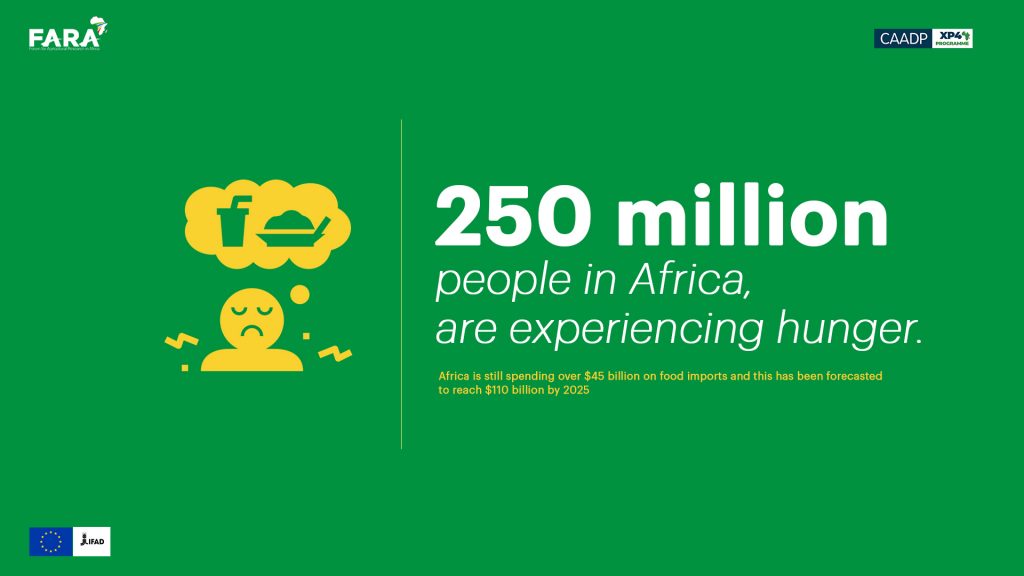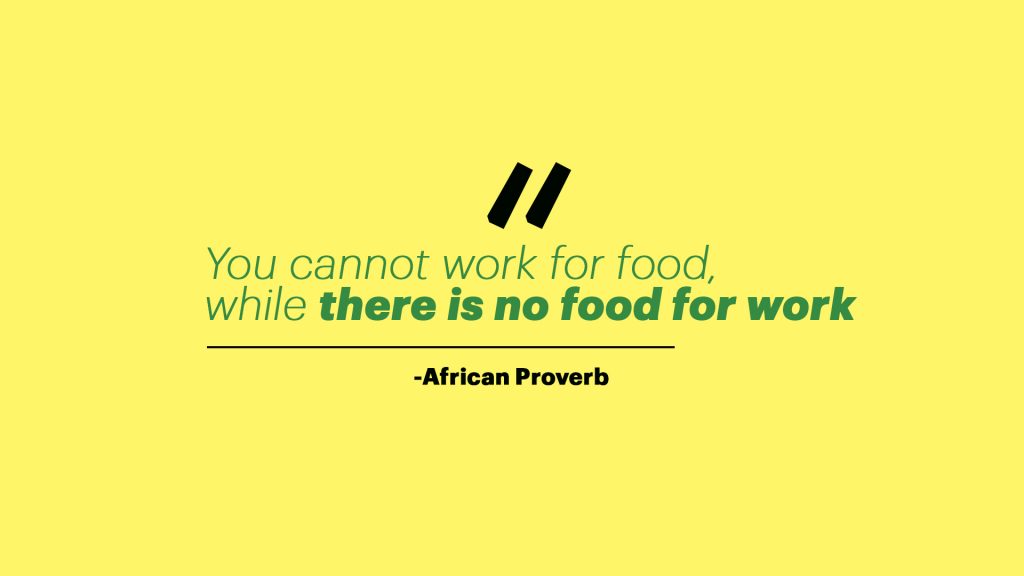You cannot work for food, while there is no food for work -African Proverb
As the African proverb suggests,
increasing women and youth participation in agriculture without creating job opportunities can be detrimental.
While we advocate for active participation of youth and women in AR4D, it should be noted that 250 million[i] people in Africa, are experiencing hunger.
You cannot work for food, while there is no food for work -African Proverb
As the African proverb suggests, increasing women and youth participation in agriculture without creating job opportunities can be detrimental. While we advocate for active participation of youth and women in AR4D, it should be noted that 250 million[i] people in Africa, are experiencing hunger.
As the world observes World Food Day on October 16, 2020, what does this mean for Africas agriculture? Over the years, efforts have been made to strengthen the collaboration among all actors in the food system including producers, the private sector, civil society, the youth, agricultural researchers, education and training providers, extensionists, policymakers and consumers. The purpose is to deploy a systems approach in formulating solutions to address the complex set of factors responsible for the prevalence of hunger. The Forum for Agricultural Research in Africa (FARA) has been at the forefront of championing the shift to the innovation systems approach to agriculture. This also involves intermediating as well as building the capacities of the diverse groups of stakeholders in the agricultural innovation system to play their roles effectively and cohesively. Despite this shift, several challenges remain, including:
Low participation of women in some components of the agriculture innovation system such as research where only 22%[ii] of agricultural researchers are female. Women account for over 40%[iii] of agricultural labour in Africa.
Africa is still spending over $45 billion on food imports and this has been forecasted to reach $110 billion by 2025[iv].
More than one in six young people, often young women[v], have lost their jobs since the beginning of the COVID-19 pandemic.

This years World Food Day presents an opportunity for African countries to take stock and re-evaluate priorities presented in the wake of the ongoing pandemic. Consequently, this is a chance to adopt innovative solutions based on scientific technologies and evidence that work for the end-user. It is also an opportunity to tighten collaboration among key actors of agricultural innovation system notably, the producers, the private sector, researchers, and policymakers, towards rebuilding elements of the food system that have been affected by the COVID-19 shocks. In 2020, FARA has convened dialogues, workshops and seminars to strengthen the capacity of stakeholders on foresight processes and commercialization of research products. It is anticipated that the collaboration cited above will accelerate the establishment of joint COVID-19 recovery plans. This will help countries to better manage risks and improve resilience.
Therefore, as countries begin to establish COVID 19 recovery plans, one key factor that is recommended is investments to increase agricultural productivity, agro-processing and storage capacities. This is especially important for staple commodities such as rice, wheat, millet, sorghum, potatoes and maize. In Sudan for example, the prices of sorghum and millet increased in September 2020 reaching new record highs[vi] largely because the country recorded low yields in 2019. In Senegal, the prices of millet equally increased[vii] reflecting the disruptions caused by the pandemic. However, in Southern Africa, the price of maize remained stable in August and September 2020[viii], because the yield was above average. The prices for the key staples are unstable because the measures traditionally deployed to cushion the prices from the impact of fluctuations in domestic production are inadequate. These measures include facilities for storage and agro-processing to extend shelf life. The interventions to increase productivity address the shortcomings responsible for price instability across the continent are laid out in the Comprehensive Africa Agriculture Development Programme (CAADP) and the African Development Banks Feed Africa Strategy[ix]. These interventions will ultimately create job opportunities for women and youth.
W orld Food Day is a day for reflecting on actions towards alleviating hunger. Actors in Africas agriculture innovation system should consider actions centred on strengthening partnerships for sharing knowledge, skills and infrastructure for increasing production and productivity and for facilitating trade and delivery of food to consumers. It is also critical to ensure that the agenda for COVID-19 recovery processes prioritizes the adoption of science and technology as a necessary tool for increasing access and availability of food, while giving special attention to expanding opportunities for women and youth employment. This will continue to be an essential agenda of the Forum for Agricultural Research in Africa.
orld Food Day is a day for reflecting on actions towards alleviating hunger. Actors in Africas agriculture innovation system should consider actions centred on strengthening partnerships for sharing knowledge, skills and infrastructure for increasing production and productivity and for facilitating trade and delivery of food to consumers. It is also critical to ensure that the agenda for COVID-19 recovery processes prioritizes the adoption of science and technology as a necessary tool for increasing access and availability of food, while giving special attention to expanding opportunities for women and youth employment. This will continue to be an essential agenda of the Forum for Agricultural Research in Africa.
The Author is Karen Munoko; Agribusiness Expert at FARA
This article was originally posted at FARA's website

